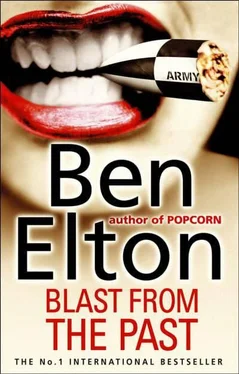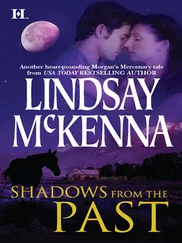He had had no time to move even had he been capable of such a thing. He stood transfixed, a knife in his hand, blood still dripping from his nose onto his mouth and chin.
“Goodbye, Jack.”
Peter heard her voice through the open door. One thin sheet of panelled wood separated them. In two steps he could be inside her flat, facing her, facing him. He held his knife. He held his breath. He could see the shadow of Polly’s arm on the latch through the crack between the open door and the frame. He could see partly into her flat, the carpet, the edge of the table, a shelf with all sorts of stuff on it.
“I’m not going, Polly. Not yet.”
It was the American’s voice, the despised voice of his hated rival. Peter wondered about running in then and there. He wondered whether he would have the chance to stab the man before he fought back. Peter knew that his enemy was assured, he remembered that from the confrontation at the phonebox. He did not wish to find himself beaten to his knees again, shamed and at the man’s mercy in front of Polly. He decided against such a full-frontal attack. Much better to leap out of the shadows at the man later when he left. Instead Peter remained dead still, now more excited than scared, luxuriating in the exquisite tension of the moment, scarcely able to believe that he was almost inside her flat, that she was hardly a foot away from him. For sheer, tense, sensual pleasure this certainly beat swearing at her over the telephone.
“What do you mean, you’re not going? You’ll go when I bloody well tell you, and I’m telling you to go now,” Polly said from behind the door.
It dawned on Peter that Polly was ordering the American out. They must have had a row and now he was being told to go. Peter raised his knife. The blade was already crusted black and crimson with his own blood.
“There are things I need to tell you, Polly,” Peter heard Jack saying from within the room, “and something I need to do. Unfinished business.”
The door closed millimetres from Peter’s face. He stepped back from it, limp with the tension.
Inside the flat Polly turned on Jack.
“Hey, Jack. Look at me,” she said. “Don’t tell me what’s what in my own place. This is today Polly, not yesterday Polly, not twenty-years-ago Polly. Not a little girl who you can screw and screw up. Not a vulnerable, exploitable fucking teenager. This is my place, right? It isn’t much, but it’s mine and while you’re here you will do what the fuck you’re told. And right now what I’m telling you to do is leave.”
“I’m not going, Polly.”
Polly looked at Jack and she did not like what she saw. She felt a surge of resentment. Who the hell did he think he was? She’d got by without him for sixteen years and she was happy to continue to do so.
“Yes, you are going, Jack, because I don’t want you as a part of my life any more. What’s more, I want you to forget about what we talked about earlier, about hurting that man. I don’t want your help with that. I can fight my own battles and if anyone’s going to hurt him it’s going to be me.”
“Whatever,” said Jack and Polly despised his tone. He did not believe her. He did not believe she could defend herself.
“You think you’re pretty tough, don’t you?” Polly said.
“Tough enough,” Jack replied.
Polly took her time before replying. “Jack, I’ve known a hundred men tougher than you. Men who don’t need a uniform and an army to give them strength, because their strength is on the inside.”
“That’s nice,” Jack replied.
Polly went back to her bed, kneeled down and dragged a bag from under it. This time Jack refrained from studying her legs as she did so. He had allowed himself to be distracted for too long. It was time to get on now.
She stood up and put the bag on the bed. “I could kill you right now,” she said, looking Jack in the eye.
“Yes, I imagine you could,” Jack replied with the same old charming smile. “You’ve certainly got cause.”
Polly could see that Jack had misunderstood her. “No, Jack, I mean really kill you. You could be dead at any moment. I have the means.”
The smile still had charm but probably only to a person who liked being patronized. “I doubt it, Polly.”
“You doubt it.”
“Well, you know,” said Jack. “Killing people isn’t easy, not unless you know how.”
“But I do know how.”
Jack did not believe her, of course, but there was something assured about her manner that put him on his guard none the less. He wondered what she was getting at.
“You know how to kill people?” he asked.
Before speaking Polly reached into her bag and seemed to fiddle with something or fix something up; whatever she did required both her hands to do it.
“Oh, yes, Jack. I know how to kill people. After I left the peace camp I became a traveller in a convoy. Ever hear about those? Loose wandering collectives of people who didn’t fit in, people who didn’t like the rules. I mentioned my friend Ziggy earlier. He was one of them. We struck fear into the heart of the British countryside a few summers back. People thought we were going to squat in their gardens.”
“Well, you know the British and their gardens,” Jack said, watching Polly closely, trying to figure out what she was getting at.
“Despite their scary reputation,” Polly went on, “most of the travellers were entirely peaceful, more peaceful than conventional types by miles, the hippies you despise, but at the centre of it all there was a core of real anarchists.”
Jack laughed. “Anarchists?”
“That’s right. People who wanted change and were prepared to fight for it. Road protesters, animal liberationists, that sort of thing. I joined them. I’m still with them. I’m not a traveller any more, but I’m still part of the struggle.”
Jack could well believe it. Polly had always been a hellcat. He could well imagine her seeking out the crappiest people in society and joining them.
“So what do you do? Smear aniseed on hunting dogs and throw paint at doctors’ cars? Chain yourself to the cosmetics counter at the chemist?”
Polly looked Jack straight in the eye. She wanted him to understand her very clearly.
“Next Tuesday we’re going to blow up a veal truck. I’m the bomb maker. I got the recipe off the Internet. This is the bomb.”
Polly motioned to the bag in which she had been fiddling. Jack would have found it hard to deny that he was a little taken aback at the abruptness of Polly’s statement. He smiled none the less.
“It doesn’t look much like a bomb, Polly.”
“Oh, yes it does, it looks exactly like a bomb. Maybe not like the sort of bomb you boys chuck about in the army, but it does look like a bomb. Any copper in Northern Ireland would recognize it quick as anything.”
Polly peered into her bag, almost as if to check that she was not exaggerating the case. She seemed satisfied.
“Besides,” she continued, “it will blow your head off, so it doesn’t really matter what it looks like, does it? It’s based on chemical fertilizer, I’ve bags of the stuff. I’ve made three bombs all in all. The first two worked perfectly – we let them off on Dartmoor. This one’s my best yet, I think. All I have to do is flip the switch.”
And with that Polly reached into the bag. Despite himself Jack jumped. He glanced down at the floor where the sack of fertilizer still lay.
“Polly, if that is a bomb then you know better than to play with it.”
“I’m not playing with it, Jack,” Polly replied calmly. “I think it’s wasted on veal, don’t you? I mean, now that I’ve got a real animal to protest about.”
She was so cool, so assured. Jack watched her face, trying to locate the lie, but he could not. He began to feel a little nervous.
Читать дальше












